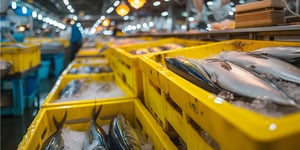
MSC CERTIFICATION
Setting the Global Standard for Sustainable Fishing and Supply Chains.
WHAT IS MSC CERTIFICATION?
MSC certification stands for Marine Stewardship Council certification. It's a globally recognized certification and eco-label program for sustainable seafood. The MSC works with fisheries, scientists, and industry to promote sustainable fishing practices, ensuring that seafood comes from well-managed fisheries that minimize environmental impact and maintain healthy fish populations. Products carrying the MSC label have met rigorous standards for sustainability, traceability, and environmental responsibility.
This certification helps consumers make informed choices about the seafood they purchase, supporting sustainable fishing practices worldwide.
- MSC Chain of Custody Standard
- MSC Fisheries Standard
- Benefits
- Requirements
- FAQs
The MSC Chain of Custody Standard is a rigorous set of guidelines designed to ensure the traceability and integrity of MSC-certified seafood products throughout the entire supply chain. This standard guarantees that seafood bearing the MSC blue label originates from a certified sustainable fishery and remains separate from non-certified products at every stage, from the fishery to the final consumer.
Purpose and Goals:
The purpose and goal of the MSC Chain of Custody Standard are to ensure the traceability and integrity of MSC-certified seafood products from the fishery to the final consumer. This standard aims to prevent the mixing or substitution of certified products with non-certified ones by requiring businesses to implement robust tracking and segregation systems. By maintaining accurate documentation and proper labeling, the standard helps preserve consumer trust in the MSC blue label and supports the overall mission of promoting sustainable fishing practices.
Ultimately, the goal is to provide a reliable framework that upholds the credibility of MSC certification and guarantees that seafood products labeled as sustainable are sourced and handled responsibly throughout the supply chain.
Key Elements of the MSC Chain of Custody Standard:
Traceability: Ensures that MSC-certified seafood can be tracked through each stage of the supply chain.
Segregation: Prevents the mixing of certified and non-certified products during processing, storage, and transportation.
Documentation: Requires comprehensive records to verify the origin and handling of certified seafood.
Identification: Ensures certified products are correctly labeled and easily recognizable.
System Integrity: Mandates robust internal systems to manage certified products and maintain compliance.The MSC (Marine Stewardship Council) Fisheries Standard is a comprehensive set of guidelines designed to ensure that seafood products come from sustainable and well-managed fisheries.
Purpose and Goals:
Sustainable Fishing Practices: MSC aims to promote sustainable fishing practices that maintain healthy fish populations and minimize environmental impacts.
Consumer Assurance: It provides consumers with a credible and trustworthy eco-label to identify seafood products that come from sustainable fisheries.
What is the MSC Fisheries Standard?
MSC certification is based on three core principles:
1. Sustainable Fish Stocks:
Objective: Ensure that fishing activity does not deplete fish populations to unsustainable levels.
Criteria: Fisheries must operate at a level that allows fish populations to remain productive and healthy. This includes setting and adhering to catch limits that do not exceed the capacity of fish populations to replenish.
2. Minimizing Environmental Impact:
Objective: Protect the structure, productivity, function, and diversity of the ecosystem.
Criteria: Fishing operations must minimize bycatch (the capture of non-target species) and reduce impacts on habitats and other marine species. This ensures that the marine environment remains healthy and resilient.
3. Effective Fisheries Management:
Objective: Ensure that fisheries are managed responsibly and adapt to changing environmental conditions.
Criteria: Fisheries must comply with relevant laws and regulations, have a robust management system in place, and demonstrate effective monitoring and enforcement. Management practices must be responsive to scientific advice and environmental changes to ensure long-term sustainability.
Market Access: Access to markets that prioritize sustainable seafood sourcing.
Consumer Trust: Recognition and trust from consumers who seek sustainable seafood choices.
Environmental Impact: Contribution to sustainable fisheries management and marine conservation efforts.
Business Opportunities: Differentiation in the marketplace and potential for premium pricing for certified products.
Requirements for MSC Certification
Achieving MSC (Marine Stewardship Council) certification involves meeting stringent standards for sustainable fishing practices and traceability.
Here are the key requirements for both fisheries and supply chain businesses:
Fisheries Requirements
-
Sustainable Fish Stocks:
- Objective: Ensure fishing activity does not deplete fish populations to unsustainable levels.
- Criteria: Fisheries must operate at a level that allows fish populations to remain productive and healthy. This includes setting and adhering to catch limits that do not exceed the capacity of fish populations to replenish.
-
Minimizing Environmental Impact:
- Objective: Protect the structure, productivity, function, and diversity of the ecosystem.
- Criteria: Fishing operations must minimize bycatch (the capture of non-target species) and reduce impacts on habitats and other marine species. This ensures that the marine environment remains healthy and resilient.
-
Effective Fisheries Management:
- Objective: Ensure fisheries are managed responsibly and adapt to changing environmental conditions.
- Criteria: Fisheries must comply with relevant laws and regulations, have a robust management system in place, and demonstrate effective monitoring and enforcement. Management practices must be responsive to scientific advice and environmental changes to ensure long-term sustainability.
Chain of Custody Requirements
-
Traceability:
- Objective: Ensure MSC-certified seafood products can be traced back through each stage of the supply chain to the certified fishery.
- Criteria: Each company in the supply chain must have a documented system in place to track certified products and segregate them from non-certified products.
-
Segregation:
- Objective: Prevent mixing of MSC-certified products with non-certified products.
- Criteria: Certified products must be clearly identifiable and kept separate from non-certified products during processing, storage, and transportation.
-
Documentation:
- Objective: Maintain accurate and comprehensive records to verify the origin and handling of MSC-certified products.
- Criteria: Businesses must maintain documentation that demonstrates the flow of certified products through their operations, including purchase records, sales invoices, and inventory records.
-
Identification:
- Objective: Ensure MSC-certified products are correctly labeled and identified throughout the supply chain.
- Criteria: Certified products must carry the MSC logo and certification code to ensure they can be easily recognized as coming from a certified source.
-
System Integrity:
- Objective: Implement robust internal systems to manage MSC-certified products and ensure compliance with the Chain of Custody Standard.
- Criteria: Businesses must have systems in place to monitor compliance, train staff, and address any non-conformities that arise.
Certification Process
- Initial Inquiry and Application: The process starts with an initial inquiry and application to an accredited certification body.
- Assessment: The certification body conducts a thorough assessment, including site visits, stakeholder consultations, and data review.
- Public Consultation: Stakeholders provide input during the assessment process.
- Decision: The certification body reviews findings and decides on certification.
- Annual Audits: Certified entities undergo annual surveillance audits to ensure ongoing compliance.
- Reassessment: Every five years, a full reassessment is conducted to renew certification.
By meeting these rigorous requirements, fisheries and businesses in the supply chain can achieve MSC certification, demonstrating their commitment to sustainable fishing practices and ensuring the integrity of MSC-certified seafood products.
What is MSC certification?
- MSC certification is a program that verifies seafood products come from sustainable fisheries that meet rigorous environmental standards.
Who can apply for MSC certification?
- Fisheries of all sizes, seafood processors, and retailers can apply for MSC certification if they meet the MSC standards for sustainable fishing practices.
What are the benefits of MSC certification?
- Benefits include access to markets that prioritize sustainable seafood, consumer trust through the MSC blue label, and contributing to environmental conservation.
How does the MSC certification process work?
- The process involves application, assessment by an accredited certification body, on-site audits, stakeholder consultation, and certification decision-making.
How long does MSC certification last?
- MSC certification is typically valid for five years, subject to annual surveillance audits to ensure ongoing compliance.
What are the costs associated with MSC certification?
- Costs vary based on the size and complexity of the operation. They include application fees, assessment costs, and ongoing surveillance audit expenses.
What are the criteria for MSC certification?
- MSC certification is based on principles like maintaining healthy fish populations, minimizing environmental impact, and effective fisheries management.
Can MSC certification be revoked?
- Yes, certification can be revoked if a fishery or entity no longer meets MSC standards or fails to address non-conformities identified during audits.
How can MSC certification benefit my business?
- It can enhance marketability, differentiate products in a competitive market, meet consumer demand for sustainable choices, and comply with procurement requirements.
Where can I find MSC-certified products?
- MSC-certified products can be identified by the MSC blue label on packaging or through retailers and restaurants committed to offering sustainable seafood options.

REQUEST A QUOTE FOR MSC CERTIFICATION:
Get a quote from ASI to see how we can help you achieve MSC certification and ensure your seafood products meet the highest sustainability standards.
THE ASI DIFFERENCE
ASI offers comprehensive support to companies seeking MSC certification, guiding them through each step of the process.
By providing these tailored services, ASI helps companies navigate the complexities of MSC certification, ensuring they meet sustainability standards and enhance their market competitiveness.
